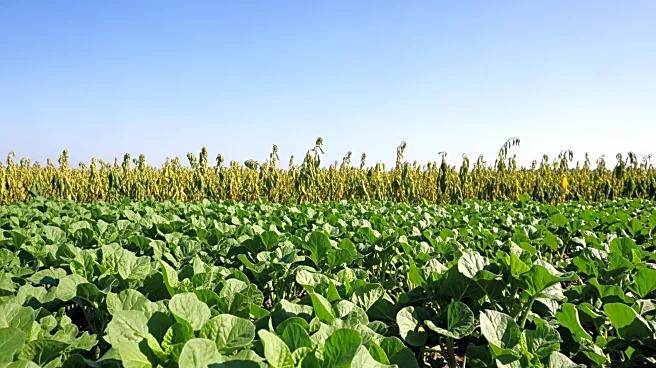What's Happening?
Herbicide carryover is a growing concern for farmers as it can negatively impact crop yields in subsequent planting seasons. According to Wesley Everman, an Iowa State University Extension weed specialist,
herbicides are designed to provide residual weed control for three to five weeks, but issues arise when they persist in the soil for 10 months or more. This persistence can affect the growth and yield of the next year's crops. Factors such as soil moisture, temperature, organic matter content, and pH levels influence the breakdown of herbicides by soil microbes. Late planting and high dosage rates further increase the risk of carryover. Farmers are advised to follow herbicide label instructions to minimize crop injury and consider conducting soil bioassays to assess herbicide levels.
Why It's Important?
The implications of herbicide carryover are significant for the agricultural industry, as it can lead to reduced crop yields and financial losses for farmers. Understanding and managing these risks is crucial for maintaining sustainable farming practices. Herbicide carryover can exacerbate other crop issues, leading to a lack of vigor and poor growth. This can impact the overall productivity of farms and the agricultural economy. By adhering to label restrictions and conducting soil tests, farmers can mitigate these risks and ensure healthier crops. The broader impact includes potential changes in crop rotation strategies and the need for more precise herbicide application techniques.
What's Next?
Farmers may need to adjust their planting schedules and crop rotation plans to accommodate herbicide carryover risks. In cases of severe carryover, replanting may be necessary, although it is considered a last resort. The agricultural community is likely to continue researching and developing strategies to minimize herbicide persistence in the soil. Extension services and agricultural experts will play a key role in educating farmers about best practices for herbicide use and soil management. Additionally, there may be increased interest in alternative weed control methods, such as biologicals and cover crops, to reduce reliance on chemical herbicides.
Beyond the Headlines
The issue of herbicide carryover highlights the need for sustainable agricultural practices and the importance of environmental stewardship. As farmers face challenges related to climate change and soil health, the industry may see a shift towards more eco-friendly solutions. The ethical considerations of chemical use in agriculture are becoming more prominent, prompting discussions about the long-term impacts on ecosystems and human health. This development could lead to increased regulatory scrutiny and innovation in the field of crop protection.











